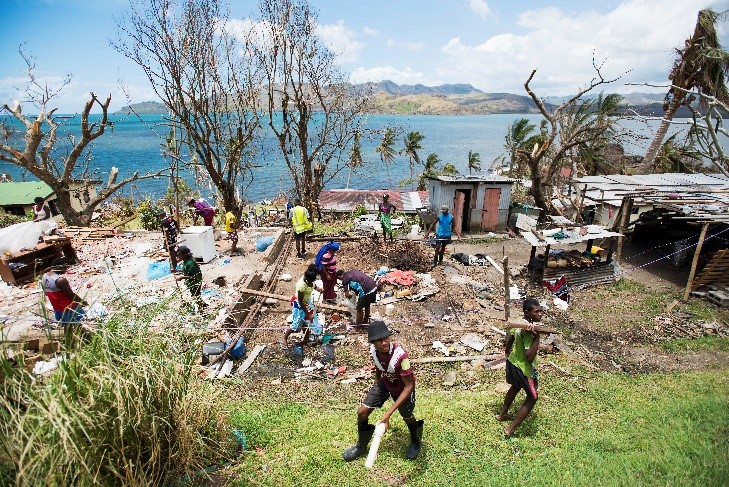Publications
Australia is committed to helping the people of Fiji meet the challenge of climate change.
At the 2016 Pacific Islands Forum, Prime Minister Turnbull announced a climate change and disaster resilience support package to the Pacific of $300 million over four years. This is part of the $1 billion climate finance Australia pledged at the 2015 Paris climate change meeting to reduce emissions and build resilience in developing countries over five years.
Australia's focus is on climate research and information, building resilience to climate change and disasters, and increasing country capacity to respond to disaster events. This support aligns with the Framework for Regional Development in the Pacific, endorsed by Pacific Island Forum leaders, which outlines an integrated approach to addressing climate change and disaster resilience. Australia also works to support Fiji's to meet its commitments under the Nationally Determined Contribution to the UN Framework Commitment on Climate Change (UNFCCC).
Key risks and challenges
Fiji's primary climate vulnerabilities stem from its exposure to tropical cyclones (averaging one to two a year), storm surge, flooding and drought. TC Winston (2016) – the strongest ever recorded in the southern hemisphere – was a reminder of the threat that natural disasters pose to the welfare and development of Fiji. The Government of Fiji and World Bank estimated damage from TC Winston at $1.2 billion (FJD2 billion), leading to a drop in economic growth from 3.5 per cent to 2.4 per cent in 2016.
More than 70 per cent of Fijians live in coastal and low-lying areas. The majority of urban centres, communities and infrastructure are exposed to storm surges and coastal flooding, which are projected to worsen. Key economic sectors including tourism (Fiji's fastest growing sector), agriculture (70 per cent of the workforce), and fisheries are weather dependent and vulnerable to the impacts of climate change. The importance of these sectors means that Fiji's economy is vulnerable to external shocks, particularly climate change and extreme weather events.
Opportunities
Work is underway in Fiji to integrate climate risks and resilience into key development sectors. Fiji has an institutional framework for enhanced climate change action through national systems, and climate change is expected to be a core focus in the National Development Plan. Fiji used its Presidency of 23rd Conference of Parties (COP23) to the UNFCCC to bring 'Pacific consciousness' to the global stage.
Tropical Cyclone (TC) Winston response and recovery
Australia committed $35 million to the response and recovery from TC Winston, of that, $20 million was committed to recovery and reconstruction efforts with a focus on education, health and markets. Australia's support includes:
- Repairs to 16 damaged schools, with 18 destroyed schools expected to be rebuilt by Term 1, 2018
- Rebuilding and upgrading the Waimaro Health Centre in Ra Province and the Nasau Health Centre in Koro Island
- Rebuilding the Rakiraki Municipal Market and accommodation (co-financed with the Fijian Government)
Buildings were designed and constructed to better withstand future natural disasters.
Bilateral programs
Australia provided an estimated $21.4 million in climate change support to Fiji from 2015-16 to 2017-18. The current Australian Aid Investment Plan (2015‑2019) commits to taking disaster and climate change risks into account across the aid program and providing emergency responses where needed.
Australia supported Fiji's COP23 secretariat and related regional consultations ($6 million 2016‑2017). The new Bilateral Fiji Support Facility manages a disaster preparedness and response fund which, in addition to responding to disasters, will support a range of resilience building activities.
Australia is also supporting women to be more involved in disaster preparedness, response and recovery measures through a range of initiatives. These include femLINK's Pacific Women's Weather Watch ($0.64 million, 2015-2018) supported through Pacific Women Shaping Development.
Climate change is a priority area for scholarships supported by Australia under the Fiji bilateral awards program ($0.16 million annually for climate change-related awards). New opportunities are also emerging in the private sector through programs including the Market Development Facility.
Regional programs
Australia's regional climate change programs benefiting Fiji total over $50 million (2015-16 to 2017-18). Our programs work to:
- Build capacity of national meteorology services and measure sea level rise through the Climate and Oceans Support Program in the Pacific;
- Improve access to and use of climate information for decision making and knowledge management through the iCLIM program;
- Strengthen climate and disaster risk and resilience across key sectors, across four countries including Fiji, through the Pacific Risk Resilience Program; and
- Provide technical support to integrate climate change across our programs.
Australia also provides support to the Pacific Regional Environment Programme (SPREP), which is mandated to address priority climate change issues.
These programs build on our long term support for climate science in the Pacific.
Global programs
Fiji further benefits from Australian global humanitarian and disaster risk reduction programs.
The Australian Humanitarian Partnership works with civil society partners to help local communities and organisations to prepare for and respond to disasters ($50 million, 2017-22). Australia has committed $5 million to the global Climate Risk and Early Warning Systems (CREWS), which runs a project to strengthen the Regional Specialised Meteorological Centre (based in Fiji).
Australia also contributes to global climate finance mechanisms, including the Green Climate Fund (GCF, $200 million committed, 2014-2018) and the Global Environment Facility ($93 million committed, 2014-2018), which support a wide range of resilience building and emissions reduction projects in the Pacific. In Fiji, the GCF has approved a USD31 million project to ensure key urban water infrastructure is climate resilient.

